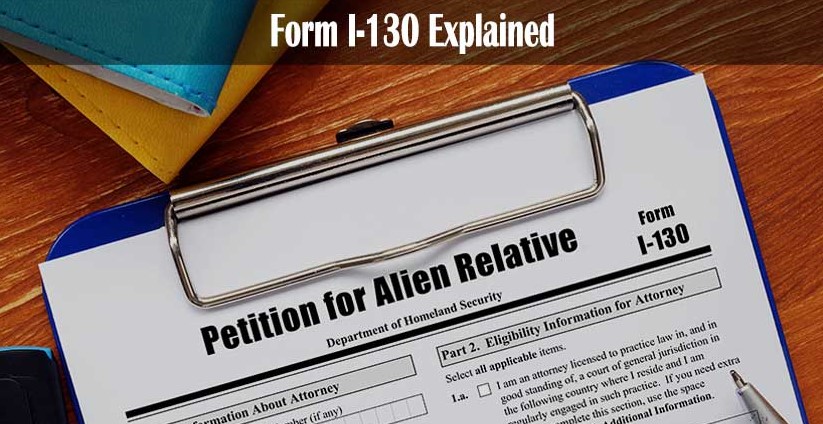Form I-130, called the Petition for Alien Relative, is an integral document in family-based immigration processes. When seeking to bring someone from overseas into the US – be it their spouse, child, parent or sibling. Understanding its nuances is absolutely key. This guide covers everything you need to know about Form I-130 including processing times, fees and the application process.
What Is Form I-130 (Petition for Alien Relative)?
Form I-130 is used by citizens or lawful permanent residents to establish qualifying relationships between themselves and foreign relatives who wish to come to America as immigrants. Which allows the first step of family-based immigration procedures.
Why Is Form I-130 Important?
Submitting Form I-130 is crucial to establish that a valid family relationship exists between a petitioner (an U.S. citizen or permanent resident) and their beneficiary (their foreign relative). Approval of this form enables their beneficiary to apply for visas or adjust their status in order to become permanent residents.
Filing Form I-130 Precisely
Accuracy in filling out Form I-130 is key to any successful petition, here’s a step-by-step guide on how to complete it properly
Personal Information:. Provide complete personal details for both the petitioner and beneficiary, such as full names, dates of birth and addresses.
Relationship Information:. Provide information regarding the nature of the relationship between yourself and the beneficiary (e.g. spouse, parent, child or sibling).
Supportive Documents:. Provide all supporting documents necessary, such as birth and marriage certificates and proof of U.S. citizenship or permanent residency.
Sign and Date:. To ensure an effective petition, both petitioner and beneficiary sign and date the form as required.
Form I-130 Filing Fee
The Form I-130 filing fee is $535 and non-refundable. Payment can be made using checks, money orders or credit cards using Form G-1450 Authorization for Credit Card Transactions.
USCIS I-130 Processing Time
Processing times for Form I-130 may differ significantly depending on multiple factors. Including your relationship type and which USCIS service center handles your case. On average, processing times typically range from five to 12 months with immediate relatives such as spouses, unmarried children under 21, parents of U.S. citizens typically experiencing shorter processing times compared with other categories.
Steps Taken After Filing Form I-130
After filing Form I-130 with USCIS, they will review your petition and related documents to evaluate them thoroughly for review. Here’s what to expect:
Receiving Notice (Form I-797C): After submitting Form I-130 to USCIS, a receipt notice (Form I-797C) will be sent confirming receipt.
Processing: USCIS will process your petition by reviewing all submitted information and documents to verify the content and validity.
Approval or Request for Evidence (RFE): USCIS may issue an RFE when additional information is necessary, while if your petition is approved you will receive an approval notice (Form I-797).
Next Steps: Once approved, cases will be forwarded to the National Visa Center (NVC) for visa processing if the beneficiary resides outside of the U.S. For those already in the US who apply, adjustment of status applications are processed directly by USCIS.
Tips for an Easy I-130 Application Process
Complete and Accurate Information: When filling out Form I-130, ensure all information provided is complete and accurate.
Submit Clear and Orderly Copies of Supporting Documents: Submit copies of all necessary supporting documents clearly organized for submission.
Respond Promptly to Requests for Evidence (RFEs): When responding to USCIS Requests for Evidence, provide all requested evidence quickly.
Keep Copies: Keep copies of documents and forms submitted as records for your records.
Common Problems and How to Overcome Them (CPUTs)
Check for incomplete forms before submitting, incorrect fees and insufficient evidence as these could all delay filing processes and reduce delays. Providing enough evidence will demonstrate your family relationship between yourself and the beneficiary is essential to successfully petitioning the government for benefits.
What to Do if Your I-130 Petition Is Denied
If your Form I-130 petition is denied, a notice detailing its reasons will be sent out explaining why. Typical reasons could include insufficient evidence or errors in application submission. You can either appeal this decision or submit another petition with additional evidence.
Navigating the Form I-130 process can be time-consuming and complex.
Syed Professional Services provides expert assistance to ensure you complete and submit your petition accurately, meeting all requirements and avoiding potential pitfalls along the way. Our team can guide you from beginning to end and can ensure all processes run smoothly and on schedule.
Filing an I-130 petition
This an integral component of family-based immigration processes, and understanding the form, fees, and processing times will ensure its successful submission. Syed Professional Services can support you every step of the way with expert guidance for filing I-130s as well as other immigration needs. Get in touch today to start this journey successfully!




